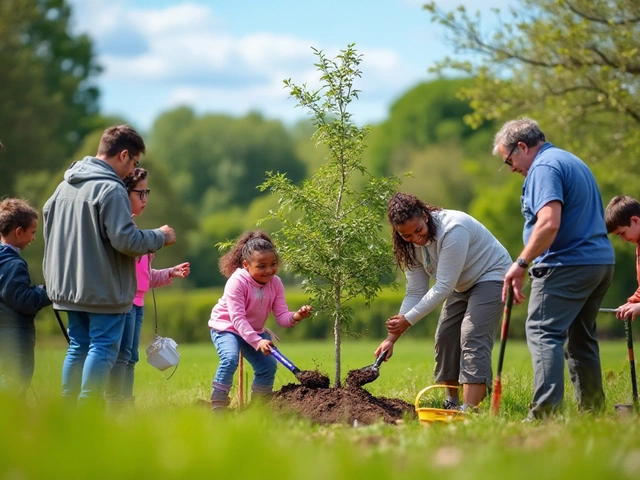Understanding the Risks of Volunteering: What You Need to Know
Volunteering is a noble and fulfilling adventure for many, but it's not without its challenges. While offering your time and skills to a cause you believe in, you might encounter a range of risks that can impact your well-being. Before setting off on your voluntary journey, it's good to know what these risks might be and how to handle them.
Every volunteering experience is unique, and the potential dangers vary significantly depending on where and how you choose to volunteer. Whether you're working in a bustling city or a remote village, it's important to recognize the physical, emotional, and legal challenges that can arise. By understanding these risks in advance, you can better prepare yourself and make the most of your volunteering mission.
- Physical Risks
- Emotional Challenges
- Legal and Ethical Concerns
- Cultural and Social Pitfalls
- Practical Tips for Safe Volunteering
Physical Risks
When considering volunteer opportunities, one might not immediately think about the potential physical risks involved. Yet, such risks are an inherent part of many volunteering roles across the globe. Whether you're building homes in areas prone to natural disasters or delivering aid in conflict zones, the physical landscape and local conditions can pose significant challenges. Even in seemingly safe environments, the nature of volunteer work can lead to unexpected situations, highlighting the need for awareness and preparation.
Exposure to harsh weather conditions is a common physical risk when volunteering outdoors. Many volunteers find themselves working under scorching sun or heavy rain, which can lead to dehydration, heatstroke, or hypothermia. Wearing appropriate clothing and taking frequent breaks for hydration are essential precautions. In areas with a high prevalence of infectious diseases, volunteers must also be mindful of health risks. Up-to-date vaccinations and knowledge of local health advisories can be critical in preventing illness.
Travel is another aspect where volunteers might encounter physical risks. Navigating unfamiliar terrains, using various modes of local transportation, and acclimating to different road regulations can be daunting. In fact, the World Health Organization reports that road traffic accidents are a leading cause of injury worldwide. Volunteers should familiarize themselves with local transport advice and consider safety equipment such as helmets if biking or riding particularly risky vehicles.
Beyond environmental challenges, the physical demands of volunteer activities can exceed what individuals are accustomed to. Duties such as lifting heavy items, standing for extended periods, or engaging in hands-on labor can result in strains or injuries if not undertaken with care. Ensuring proper training and using the correct tools can mitigate such risks. Volunteer safety can also be compromised due to insufficient rest. Exhaustion can impair judgment and reaction times, increasing the likelihood of accidents. Volunteers must ensure they have adequate rest and recovery time to maintain their physical health throughout their service.
"Safety isn't just a slogan; it's a way of life," remarked Eleanor Everwalls, a respected advocate in the volunteer sector. Her insight underscores the importance of prioritizing safety in all volunteer activities, no matter how mundane they may seem.
When volunteering near wildlife or in conservation efforts, understanding and respecting the natural habitat is crucial. There is always a risk of encounters with potentially dangerous animals or plants. Volunteers should be equipped with the necessary knowledge or even a guide to avoid unwanted interactions. In many cases, carrying a basic first aid kit is advisable, allowing prompt addressal of any minor injuries that occur.
Finally, consider the infrastructure of the location where you're volunteering. Developing regions may lack proper facilities or emergency services, elevating the volunteer safety stakes. Knowing the local emergency contact protocols and the whereabouts of the nearest medical facilities can be lifesaving. Before embarking on a volunteer opportunity, it's recommended to undertake a thorough risk assessment. Speak to the organization for detailed advice about the region's unique challenges and prepare accordingly to ensure your well-being during your volunteer stint.
Emotional Challenges
Volunteering can be a rollercoaster ride for your emotions, exposing you to situations and experiences that can challenge your mental well-being in unexpected ways. When you step into the world of volunteering, it’s not just about the practical help you can provide; it’s about engaging with people and communities often dealing with trauma, adversity, and various hardships. These environments can stir up strong emotions within you, ranging from compassion and empathy to frustration and helplessness. It's essential to be prepared for the emotional impact that can accompany such experiences, as they can often linger even once your volunteer stint is over.
One of the primary emotional challenges volunteers face is dealing with the raw and sometimes overwhelming realities of the communities they serve. In many cases, volunteers work closely with individuals who have suffered significant losses or trauma, which can weigh heavily on your heart. Seeing the struggles of others up close can induce feelings of sadness and distress, and these emotions can be intensified if you feel you're not doing enough to make a difference. Volunteers often encounter situations where resources are limited, and the problems seem too vast to conquer, leading to a sense of impotence that can stick quietly in the background of your mind.
It can be emotionally taxing to balance the desire to help with the realization of your limitations. This delicate balance can sometimes cause volunteer burnout, where the exhaustion from emotional investment leads to a reduced capacity to continue contributing effectively. According to the World Health Organization, burnout is a syndrome resulting from chronic workplace stress not successfully managed, which also applies to voluntary work. Volunteers are at a higher risk of burnout due to often overextending themselves in environments requiring high emotional capacity.
"The best way to find yourself is to lose yourself in the service of others," stated Mahatma Gandhi. Volunteering provides profound personal growth, but it can also rearrange your perspectives and challenge preconceived notions. While these changes are beneficial, they can initially create emotional unrest as you reconcile your experiences with your worldview.
An often overlooked aspect of the emotional challenges in volunteering is the formation and eventual separation from deep bonds with those you are helping. As you develop close relationships with the communities you serve, leaving can be painful, and you may feel guilt or sadness about returning to your regular life while others continue to face hardships. These feelings can create a bittersweet attachment that might lead you to question your own values and priorities. Overcoming such emotional challenges involves a great deal of self-reflection and resilience, and recognizing when you need emotional support or guidance is crucial. Setting realistic goals for your voluntary efforts and processing the emotional responses you have are vital steps in ensuring you can contribute positively without losing your mental balance.

Legal and Ethical Concerns
Volunteering, while a generous and selfless act, isn't immune to the challenges of legal and ethical concerns. These matters can arise unexpectedly and might affect not just the organizations you work with but also your personal involvement. Legal issues could range from liability concerns to work visas and insurance. Some countries may have stringent laws about foreigners volunteering, and failing to comply might lead to dire consequences, such as deportation or legal prosecution. Understanding these regulations not only protects you but also respects the laws of the host country.
Another aspect of volunteering is the ethical consideration. You have to balance helping with respecting local customs and community dynamics. Cultural misunderstandings can sometimes lead to ethical dilemmas. For instance, imposing your values on a community or inadvertently causing harm by creating dependency rather than empowerment can present significant challenges. It's crucial to engage in these activities with sensitivity and awareness, fostering genuine and sustainable impact.
Moreover, volunteer opportunities often involve working with vulnerable populations, such as children or those affected by poverty. This can bring ethical questions about data privacy and consent. Ensuring that personal data isn't misused or mishandled requires following strict procedures and guidelines, often dictated by the volunteering organization. This includes being cautious about taking photographs or sharing stories to social media without informed consent.
Many experienced volunteers stress the importance of thorough preparation and training. A good approach is to equip yourself with knowledge about the legal landscapes and ethical norms of where you'll be heading. In doing so, not only do you safeguard yourself from potential legal troubles, but you also enhance the quality of your contribution by aligning it with what is genuinely beneficial and needed.
"Volunteers must ensure they’re both legally compliant and ethically sound. In doing so, they respect the dignity of the communities they serve," says Carol Tomlinson, from the Global Volunteer Services.Legal and ethical training is often provided by reputable organizations, and prospective volunteers should utilize these resources for a smooth and responsible volunteering experience.
Cultural and Social Pitfalls
Volunteering across borders or even within diverse communities can bring about a rich tapestry of cultural experiences. Yet, this unique exposure isn't devoid of volunteer risks. Misunderstanding cultural norms or unintentionally offending the community you're meant to help can disrupt the effectiveness of volunteer efforts. Each culture has its intricacies and social cues that may not be immediately apparent to outsiders. While volunteering, it's crucial to be observant and sensitive to local customs, language nuances, and societal structures, ensuring that your actions align with the community's values and expectations.
Language barriers pose another significant challenge when volunteering in unfamiliar lands. The inability to communicate effectively can lead to misinterpretations and frustration on both ends. Even simple directives or offers of help can be misconstrued, sometimes resulting in the opposite of what was intended. Understanding body language and being patient with communication hiccups can help bridge these gaps. Additionally, it's beneficial to learn some basic phrases in the local language, as it shows respect and a willingness to engage, which is often appreciated by locals.
Adapting to diverse social dynamics is essential for a harmonious volunteering experience. In certain cultures, things like punctuality might not be as imperative, or hierarchy within community members could be much more pronounced. Recognizing and respecting these differences can prevent awkward situations or miscommunications. There can also be norms regarding gender roles or modest attire that volunteers should be mindful of, to avoid offending anyone inadvertently. A common mistake is assuming that the way you are used to seeing the world is the same everywhere and underestimating the importance of these cultural differences.
"To know the culture is to know the people behind it," noted Margaret Mead, a cultural anthropologist. Her insights remind us of the profound depth and understanding required to volunteer effectively in diverse social settings.
Being prepared for a culturally distinct environment involves more than just awareness; it also entails building genuine relationships within the community. One way of doing so is by showing interest in local traditions and festivities, which opens avenues for meaningful connections. Respectfully asking questions and participating enthusiastically demonstrates sincerity and builds trust. Volunteer organizers often advise participants to delve into research about the culture and people before they arrive to prepare mentally for the change in environment.
Finally, social media has reshaped the way we view cultures and can sometimes paint an inaccurate picture of a community. As a volunteer, avoid relying solely on these platforms for cultural knowledge. Instead, engage in conversations with those who have previously volunteered or worked in the region. These firsthand experiences offer more nuanced perspectives, helping to avert potential social pitfalls. After all, the key to a successful volunteer experience is mutual respect and understanding.

Practical Tips for Safe Volunteering
Embarking on a volunteering mission is thrilling, but it’s crucial to ensure your safety while you give back to the community. One of the first things you should do is research extensively about the organization you're joining. Look up any past records or reviews, and assess whether they have adequate safety protocols in place. It's like doing your homework before taking part in any activity; preparation can save you from a potentially risky situation.
Next, consider getting a comprehensive health check-up before you travel, especially if the volunteering opportunity is in another country where certain diseases might be prevalent. Something as basic as ensuring all your vaccinations are up to date can save you a lot of trouble later. If applicable, pack a first aid kit, personal protective gear, or any necessary medication, as these can be life-savers. Also, familiarize yourself with the healthcare facilities available in the area where you'll be stationed.
Another vital tip is embracing cultural awareness. Understanding and respecting the customs of the local community not only eases integration but also helps in avoiding conflicts. When you respect the local traditions and practices, you create an environment of mutual respect and trust, which is essential for a safe and successful volunteering effort. Local communities are often your first line of support in emergencies, making it important to build strong, respectful relationships.
Stay Connected and Informed
Keeping an open line of communication with someone back home is another tip every volunteer should take seriously. Share your itinerary and contact details with family or friends. This doesn’t just provide peace of mind to your loved ones; it makes sure someone knows your whereabouts if anything were to happen. Access to reliable communication devices and methods like phones or the internet is vital for your safety and security.
International volunteering often involves travel to areas with different legal systems or social norms. Awareness of these differences is crucial. According to a report by the World Health Organization, volunteers are more likely to comply with local laws if they are informed and respect the host country’s regulations. Legal issues can complicate a volunteering trip and even lead to detainment, so staying informed is key.
"Volunteering in another country is a wonderful way to help others and immerse yourself in a new culture, but it requires diligence and awareness to do so safely," says Dr. Emily Jenkins, a professor of international community development.
- Always make sure you have proper identification on you at all times, like photocopies of your passport in case original documents are lost.
- Keep emergency contact information accessible, such as local authorities' numbers or the nearest embassy or consulate.
- Familiarize yourself with the emergency procedures in your work area and practice any given evacuation or safety drills.







